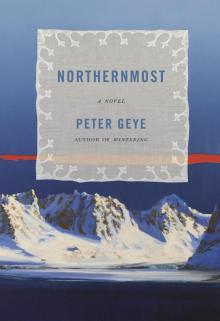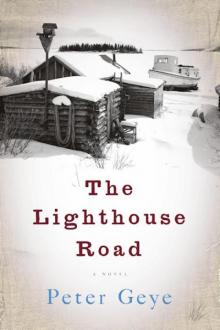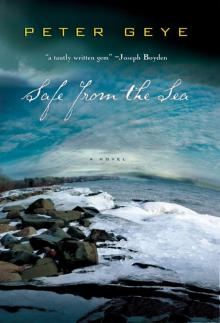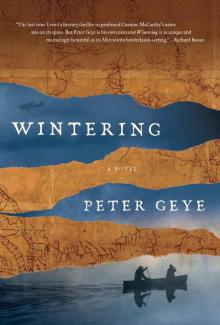- Home
- Peter Geye
Safe from the Sea Page 4
Safe from the Sea Read online
Page 4
“I wish I could remember her better.”
“My mother was the single kindest person I ever knew. A saint she was. Never hit me once, never even raised her voice,” Olaf said, taking a long, satisfying puff on his cigar.
“That’s how Mom was, too.”
Olaf glared out at the water, toward a horizon resting somewhere in the middle of the lake. “My mother, she was faithful. She loved my father, God knows why. She was patient.”
Noah interpreted his father’s words as a challenge, knew that if he wanted to he could have a fight. Enough forbidden history surrounded Noah’s mother to keep him and Olaf fighting for a while. Noah pictured Phil Hember—their neighbor across the street from the old house on High Street—his mother’s lover during Noah’s high school years. There was some forbidden history. Noah resisted the temptation to bring it up. They watched the lake churning.
Olaf finally cleared his throat, spit, and stubbed out his cigar. “Solveig tells me you sell maps out in Boston.”
Caught off guard by the change in topics, Noah stammered. “That’s right. Antique maps.”
Olaf looked suspect. “Who needs an antique map?”
Noah described the maps as works of art. He told his father how he’d come to own the shop.
“What about teaching?” Olaf asked.
“I wasn’t a very happy teacher. Not a very good one, either.”
Olaf teased Noah about all those wasted semesters of college. Noah heard the good-natured timbre of the old man’s needling, so he spoke more of his own crash course in learning the business and of its strange and unexpected growth thanks to the Internet. He wondered whether his father knew what the Internet was. Noah told him about Ed, and of how the colonel reminded him of Olaf himself, of how when the mood to lecture struck him the colonel could not be stopped. Finally he said, “I have Natalie to thank. She’s the one who reviewed the prospectus and lease—she even negotiated the purchase. She’s got a mind for details I don’t have myself.”
“So how are you making it go?”
“I guess I have a mind for the maps.”
And because Olaf seemed interested, Noah elaborated. Some of the maps were three or four hundred years old and from as far away as the Horn of Africa. He described the beautiful Latin and French words he had such trouble translating, the beautiful script they were written in.
Olaf, looking even more dubious, said, “Say I wanted to buy one of these maps, what would it set me back?”
“You could spend a hundred bucks, you could spend ten or twenty thousand.”
“For an old map that couldn’t get me out the front door?”
So Noah explained again how they were less maps than collectibles, or, he repeated, works of art. Not to be used, as his father said, for getting out the front door but for admiring on the wall in your billiard room, to ogle with your country-club friends over twenty-year-old scotch.
Olaf said, “I’ll take my atlas and gazetteer.”
“When was the last time you needed an atlas?” Noah said, remembering his father’s instructions for finding the house.
“Let’s just say one won’t be necessary to find lunch. You hungry?”
OUTSIDE THE MANITOU Lodge hay bales and cornstalks and pumpkins had been set out for Halloween. There were a dozen pumpkins, all half eaten, a feast for the deer; their tracks were all over the mud. Three cars were parked in the lot, but inside, the dining room was deserted.
It was a moderately sized room with grand ambitions. The walls were paneled with dark, stained wood, and the vaulted ceiling supported four chandeliers that aspired to some kind of elegance but failed. A rippling, knotted pine floor glimmered, polished to a shoe-shine brown. Along one wall a colossal fireplace with a mantel as big as a canoe loomed over the deep hearth. Hanging over the mantel a moose head and antlers spanning four feet surveyed the room with glass eyes. On either side of the fireplace black-bear skins hung like paintings. Above the wall of windows that faced the highway, a dozen fish—chinook and brown salmon, steelhead, northern pike, walleye—hung mounted on elaborately carved and lacquered pieces of wood. The tables were sturdy and unvarnished and covered with paper place mats and lusterless silverware. The three waitresses wore black skirts and white blouses. One of them directed Olaf and Noah to a table by the window and gave them menus.
“Our soup of the day is Lake Superior chowder,” she said, filling their water glasses. She switched a peppermint from one cheek to the other and asked if they had questions.
Olaf said, “Give me the chowder. And coffee.”
Noah smiled and asked, more politely, for the same. The waitress put her pencil behind her ear, collected their menus, and walked toward the kitchen.
“Once upon a time you would have ordered a bottle of suds with your chowder,” Noah said.
“A bottle of suds? Times you’re talking about I’d have skipped the chowder altogether, ordered four boilermakers over the noon hour, and called that lunch.”
“No more boilermakers?”
“No more cigarettes, either.”
“Since when?”
Olaf ran his hand through his beard. He appeared reluctant to speak. “On the way back from your wedding I stopped in the Freighter for a pair of bourbons before finishing my drive up here. Twenty straight hours I’d been behind the wheel, thought I deserved a nip.” He paused, ran his hand through his beard again. “Met a couple of the old boys. We had a high time of it. A high time.
“The next morning I woke up in the truck. Couldn’t see a thing, the windows were all rimed from a night of snoring. I mean, they were completely fogged over. I had no idea where I was until I stepped out of the truck.” He smiled, looked almost as if a punch line were in the offing. “I was parked in front of the old house up on High Street. Hadn’t lived there in what, three years?” His smile vanished. He paused to look Noah in the eyes. “One of my bright shining moments. Enough was enough.”
“Just like that?” he said.
“Never a drop since.”
“I didn’t know people could quit drinking like that.”
Olaf merely raised his shoulder to his ear and closed his eyes for a moment. “I guess they can,” he finally said. “At least I did.”
“Do you miss it?”
“Not the booze, but I’d smoke a hundred cigarettes a day if they weren’t such hell on me.”
“What’s that?” Noah asked, pointing at an envelope on the table.
Without a word Olaf slid its contents onto the table. There were two dozen or more photographs sheathed in plastic. Olaf took one of the photos from the pile, set it down on the place mat, and wiped an imaginary layer of dust from it. He looked at Noah from over the top of his glasses—big, black-rimmed bifocals that he’d pulled from the pocket of his flannel shirt. “I guess this is what I wanted to show you.”
The waitress interrupted them with their soup. Noah thanked her.
At the same moment, as if they were one man in a mirror, they moved their soup aside. Olaf said, “Anyway.”
Noah sat dumb as his father took one and then another of the photographs from their plastic wraps. The first, a black-and-white snapshot of five men standing on the main deck of the Ragnarøk and two others suspended over the side, one in a bosun’s chair, the other on a rope ladder, looked like something out of a Life magazine pictorial. Printed on heavy Kodak paper, it had faded to sepia. Of the seven men Noah recognized three: his father, Jan Vat, and Luke Lifthrasir. They all wore scowls on their faces and looked identical in dress, wearing black wool caps, three-quarter-length peacoats unbuttoned to the waist, gray trousers cuffed at the ankle, and thick-soled black boots. The ship’s bowline was attached to a harbor cleat, sagging heavily under the weight of icicles. The ship, as the unmistakable block letters of his father’s handwriting on the back of the photograph said, was wintering up.
On the deck behind the men, the riveted hatch coamings and covers and the hatch crane were glazed with ice. The two men hang
ing over the side of the ship chiseled at a layer of ice. The men on deck all wore that expression so fixed in Noah’s memory—they looked caught between humor and tragedy, as though they were thinking, simultaneously, that they were elated to be home but craved leaving again, too.
In the steely background of the picture, a million shades of gray blended into the harborscape: the cone-shaped piles of taconite and limestone, the enormous cranes and rail tracks, the rail cars steaming with coal heaps. Fences, barbed wire, wooden pallets. The crisscrossing power lines and ten-story-tall grain and cement silos. A squat tug steaming through snow flurries. Ice. And, enveloping all of it, smoke from a thousand stacks and steam whistles.
Noah looked up from the picture and saw his father staring out the restaurant window. Noah thought of saying something but looked back down at the picture instead. In the background he recognized a big part of his boyhood. Driving into downtown Duluth just two days earlier he’d felt similarly transported in time. In his exhaustion he’d chalked it up to the depressive autumn mood that seemed to have settled on the city like the fog. But now, seeing the same place and thing in a different time and in different hues, he knew that he had mistaken fatigue for the nature of the city, not autumn’s coming on.
He thought back to his boyhood and the ships, his father’s ship especially—his third, actually, the storied Rag. The Superior Steel Company had a fleet of fourteen ore boats, and though there were many distinctions in their size and capacity, in their age and shape, each of the ships was distinctly superior—as they were known across the lakes—as well. Just as the Pittsburgh Steamships wore their tin or silver stacks, so the Superiors wore their black hulls and white decking. And emblazoned on the stern and port side of each ship’s nose the diamond and S.S.C. logo of the fleet looked like an opened serpent’s mouth. Though any ship from any fleet or port of call stirred something like awe in Noah—even now but especially as a boy—the ominous, serpentine Superiors ruled his imagination.
And the Rag, of course, ruled most, both in Noah’s boyish imagination and in the collective imagination of the people of Duluth. Although flagship honors fell on the newer, bigger SS Odin Asgaard, the Rag remained—until her foundering—the secret darling of the Superior Steel Company brass. Her officers’ crew all hailed from Duluth, a fact that alone would have made her revered, but she had a mystique, too, one whispered about in the sailors’ bars and church basements. Though exaggerated, an ounce of truth pervaded the legend. She was tenacious in wicked seas, as she proved over and over again in the November gales. She’d withstood ice, the shoals, the concrete piers jutting out into the lakes from Duluth to Ashtabula, and even, allegedly, a tornado in the middle of Lake Huron. She possessed the belly of a whale, too, exceeding her load limit from one trip to the next. Though the Asgaard was one hundred feet longer and made to carry three thousand tons more ore than the Rag, though the Asgaard and her type eventually replaced the ships in the Rag’s class, during the last few years of her life the Rag performed—categorically—on an almost equal annual footing with the flagship. She was the mother of the Superiors, even if not her majesty.
Noah knew all this because when the subjects of ski jumping, what was for dinner, or the goddamn unions weren’t being discussed at home, the Ragnarøk was. He knew her statistics like some kids knew the batting averages of their favorite ballplayers. He could still remember them.
Olaf’s voice seemed to whistle at him. “That’s the Rag.”
Noah looked up from the picture and saw his father’s nub pinky—the one that had been amputated at the second knuckle because of frostbite—pointing at the picture. “I know.”
“And those are the Bulldogs there, the Bulldogs and a couple hands working on the hull.” “Bulldogs” was the moniker given to the all-Duluth officer crew of the Rag in honor of their tenacity but also because it was the namesake of the local state college. “That kid in the chair is Bjorn Vifte. You knew Bjorn. Seventeen years old there. That’s me, of course, that’s Jan, that’s Joe, that’s Luke—you knew him, too—and that’s Danny Oppvaskkum, the engineer. This picture was taken a few days after Christmas the year before she went down.”
“Who’s this?” Noah asked, pointing to the kid on the ladder.
“Ed Krebs, one of the deckhands.”
“And who’s Joe?”
“Joe was second mate. Joe Schlichtenberg. He hung around when you were a kid. Joe probably froze to death. Or drowned. Danny O. was in charge of the engine room. He probably burned to death.”
Noah had always longed to hear—from his father—the story of what had happened the night the Rag went down, and even a hint of it got his pulse thrumming. “The ship here, she’s at Fraser shipyards?”
“Four or five ships from our fleet wintered up there every year. In ’66 and ’67 the Rag got her new engine, a diesel. They did it at Fraser.”
“You guys all look the same.”
“We were.”
They sat in the dining room of the Manitou Lodge for a couple hours, talking about each photograph as if it were a wonder. The pictures dated as far back as the spring of 1938, Olaf’s first year on the lakes, when he had shipped as a deckhand on the two-hundred-fifty-three-foot Harold Loki, a ship named for the original chief executive of Superior Steel. Olaf was a baby-faced kid in one of the pictures, his shirtsleeves rolled to the elbows, a cigarette dangling from his lips while a buddy’s hand stuck him with a fake jab to the ribs. Along both sides of the main deck of the ship in the background, a procession of fresh-air vents loomed like a marching band of tuba players, and the smokestack in the stern coughed up its coal smoke in pitch-black plumes.
Olaf couldn’t remember the other deckhand’s name, but he told Noah about a whole crew’s worth of sixteen-and eighteen-year-old kids shipping out in order to avoid abusive fathers or college. Some of the boys, he said, were just cut from the lonely cloth and wanted to get lost. He told him about Tony Ragu, a kid from Muskegon who worked on the Loki for the first three months of the shipping season that year before being picked up by the Duluth Lumberjacks, a minor league baseball team that wanted his ninety-five-mile-per-hour fast-ball. He remembered Cliff Gornick, a Chicago guy who put himself through Northwestern Law School by working Superior Steel boats in the summer and who eventually became a famous Chicago newscaster. Russ Jackson was the first black guy he saw on the boats, second cook on the Loki. A potbellied, middle-aged man with a receding hairline and a wife and seven kids in Detroit, he cooked the best beef brisket north of New Orleans. Olaf smiled when he talked about the Cejka brothers—one of whose sons was later a watchman on the Rag—thick-shouldered shovelers who worked in the engine room of the Loki moving coal. If not for the whites of their eyes and their ungloved white hands, Noah might not have known there were any people in the picture at all.
There were pictures of the aerial bridge at the entrance to Duluth harbor, cloaked in fog, a cat’s cradle of steel; of the Loki, the Valkyrie—his father’s second ship—and the Rag all scuttling through the locks at Sault Sainte Marie; of the Mackinac bridge spanning the straits between Lakes Huron and Michigan; of the loading and unloading complexes in Gary and Conneaut; of crewmates, some anonymous or forgotten, others so well remembered it seemed as if Olaf expected them to walk into the dining room any minute and join them; and of Olaf, standing in front of the offices of Superior Steel in the LaCroix Building on East Second Street in downtown Duluth, an ear-to-ear grin on his twenty-eight-year-old face the afternoon he passed his Coast Guard exam to become an officer, and standing behind the wheel in the pilothouse of the Valkyrie.
Noah looked up and down between the pictures and his father, and what struck him was how much he himself resembled the man in the photographs and how little the man sitting across from him now did. Three days ago he might have overlooked his father in a crowd, now he felt like he was him. Noah wondered, as his father reconstructed more than thirty years of his life with the help of the photographs, how it had felt to be him then
, in the spring of 1938, and how it felt to be him now, with the burden of all that had happened and all that he’d suffered, suffering who knew what illness. More than anything Noah wondered what it would be like to sit across the table from a son, imagined a whole lifetime of moments like this: spooning baby food, helping with homework, explaining the birds and the bees, sharing a beer over a cribbage board.
By the time the waitress announced that the dining room was closing for the afternoon, they’d finished with the photographs and had been sitting in a reverential silence. “Listen, Dad,” Noah said, “why don’t you pack these up? I have to call Nat before we head back to the house.”
Olaf said, “Sure, sure.” And with the care of a surgeon, he placed each of the photographs back into their sheaths and then into the manila envelope.
“WE’LL BE OUT of your hair in a minute,” he assured the waitress behind the cash register at the Manitou Lodge. She nodded and turned her attention back to painting her nails as Noah dialed the pay phone.
“Hey,” he said, “I didn’t think I’d catch you.” The phone at Natalie’s office had rung five times before she’d picked up.
“I was starting to think you’d forgotten me. I left messages on your cell.”
“I don’t have cell reception up here. Sorry. I was going to call last night.”
“It doesn’t matter. I worked late last night anyway. New clients.” She was a management consultant and never discussed clients by name. The late nights were a job hazard. “How’s your father? How’s everything going?”
Noah looked out the window at the galloping lake, he glanced at his father. “It’s hard to say. We went fishing yesterday,” he said as though it were the strangest thing. He paused. “What about you?”

 Northernmost
Northernmost The Lighthouse Road
The Lighthouse Road Safe from the Sea
Safe from the Sea Wintering
Wintering